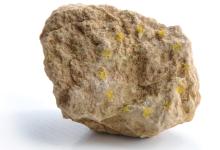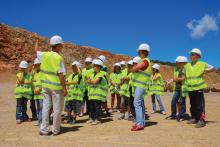
The European Aggregates Association looks at how the EU's new 10 year policy - the 2020 strategy - will impact on innovation and raw materials.
Planning for future demand is a key part of aggregate production and ensuring aggregate reserves meet with government targets is essential. With the EU's new 10 year plan in place, the
The EU's 2020 Strategy was unveiled in March last year and sets out a vision for Europe's social market economy over the next decade, and rests on three interlocking and mutually reinforcing priority areas. The points are smart growth - developing an economy based on knowledge and innovation; sustainable growth - promoting a low-carbon, resource-efficient and competitive economy; and inclusive growth - fostering a high-employment economy delivering social and territorial cohesion.
In order to meet the targets, the Commission proposes a Europe 2020 agenda consisting of seven flagship initiatives. In particular, the flagships on industrial policy, innovation union and resource efficient Europe highlight aspects of the future framework of the European raw materials strategy.
The EU 2020 Strategy flagship on innovation aims at re-focusing research and development and innovation policy on major challenges, while closing the gap between science and market to turn inventions into products.
One key element of the initiative is the development of European Innovation Partnerships, which will mobilise stakeholders - European, national and regional, public and private - behind well-defined goals in areas which combine tackling societal challenges with potential for Europe to become a world leader. The partnerships will step up R&D, coordinate investment, speed up standards and mobilise demand. The Commission will provide 'seed corn' funds to attract stakeholder funding. A pilot partnership on active and healthy ageing is being launched, and more partnerships will follow on areas such as energy, 'smart' cities and mobility, water efficiency, and non-energy raw materials.
The partnership is set up in the context of the Raw Materials Initiative adopted by the Commission in 2008 and fully endorsed on different occasions in the Council (in May and December 2009, as well as May 2010) which asked for swift action including in the area of research and innovation. This partnership on raw materials would therefore be a separate, but parallel track to the Raw Materials Initiative.
On 9 December 2010, DG Entreprise invited key stakeholders to a meeting, in order to present the framework of this potential partnership. The final decision to set up this partnership will depend on the
The Partnership Raw Materials for a Modern Society will be driven by a high-level steering group, which will prepare a multi-annual roadmap 2011- 2020, and underpinned by an expert group which will prepare the Partnership meetings and coordinate the milestone details among the stakeholders. The partnership would be organised around five working packages (WP):
• WP1 involves developing new innovative technologies and solutions for sustainable raw materials supply. Innovative approaches shall address all aspects of the value chain including efficient resource processing. 10 new pilot plants would demonstrate innovative approaches. Recycling would be an important field.
• WP2 relates to developing new innovative technologies and solutions for the substitution of critical materials, based on the priority list identified and published by the
• WP3's focus is improving Europe's raw materials knowledge and infrastructure base. Collaboration between Geological Surveys and other research organisations will be key to this working package.
• WP4 will look at improving the regulatory framework via promotion of excellence and promoting recycling through public procurement and private initiatives. Enhanced cooperation between Member States authorities aiming at streamlining the procedures (for example minerals policies, including mining law, land use planning and permitting processes and Pan-European infrastructure, inspection of mining facilities) and promoting success stories.
• WP5 focus on international involvement. A close interaction between the working packages is needed in order to accelerate the economic opportunities in particular for SMEs. The stakeholders will meet for a workshop on 28 February 2011 in Brussels. UEPG will have a representative and this follows up the input from the European Technology Platform for Sustainable Material Resources.
In light of the growing focus on resource efficiency and recycling, the European Minerals Forum Dinner Debate with MEPs, which will take place on 13 April this year in the European Parliament Salon, will tackle this topic.









